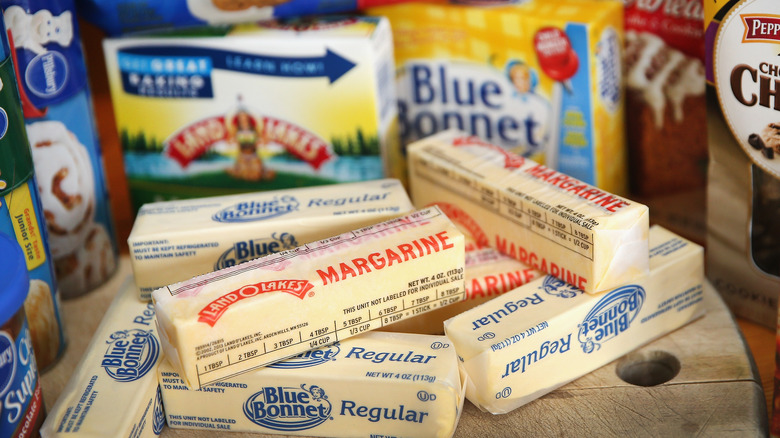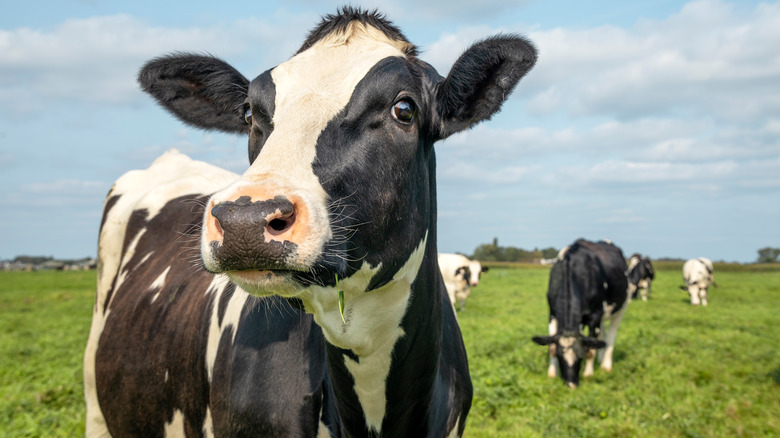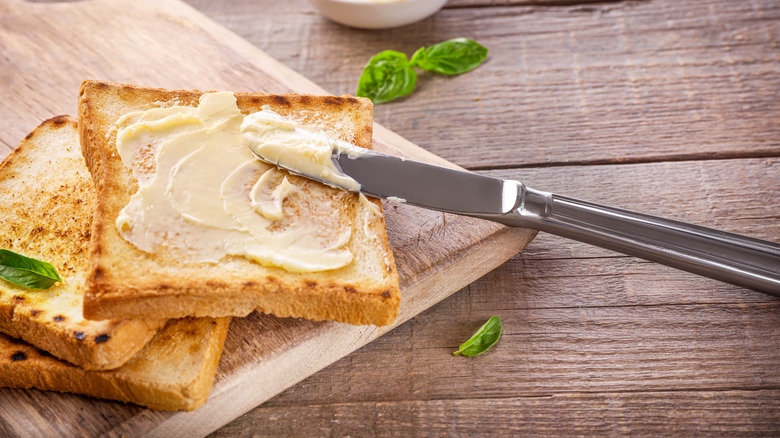It's Illegal For Wisconsin State Prisons To Serve Margarine. Here's Why
Anyone alive in the '90s will surely remember hunky heartthrob Fabio and his I Can't Believe It's Not Butter commercials (per YouTube). The basis for these advertisements was that the non-butter product was so close to the real thing that the two were indistinguishable. Most of the ads ended with Fabio proclaiming the product's name in amazement, usually as some lovelorn woman ogled him.
These ads illustrate the protracted feud butter and margarine have been embroiled in for years. For the uninitiated, WebMD explains the differences between butter and margarine. Butter consists of churned cream or milk and is rich in saturated and trans fats, both of which are associated with certain health risks. On the other hand, margarine is made with plant-based oils and contains healthier fats, such as polyunsaturated and monounsaturated types. However, additional fats are often added to margarine to help it remain solid, which puts some brands on an even playing field with butter in terms of nutrition. Despite margarine being a ubiquitous alternative to real butter, one state actually has laws on record that restrict where it can be sold.
Wisconsin aims to protect its dairy industry through margarine regulation
Per the Wisconsin State Legislature, it's not permissible to serve "oleomargarine or margarine to students, patients or inmates of any state institutions" unless there is a verifiable medical reason to substitute margarine for butter. CBS News explains that Wisconsin was spurred to regulate the use of margarine in the state to protect its dairy industry, which grew concerned about the artificial spread usurping butter's reign after margarine was invented in 1870. In addition to state institutions, restaurants were also restricted by the law, which stipulated that margarine could not take the place of butter in dining establishments.
According to FDL Reporter, these laws have since become slightly altered, giving certain institutions greater leeway regarding margarine. For example, federal guidelines require schools to limit the percentage of saturated fats consumed by students, which means that margarine is common in many learning institutions. The same goes for jails and hospitals, which are free to serve butter substitutes at their discretion. However, the law remains in place for state prisons and restaurants, which can only provide margarine to diners when it's specifically requested. Fortunately, there are plenty of tasty butter options for state residents who want to support the dairy industry.
Wisconsin butter for every recipe and occasion
Wisconsin Cheese offers some important insight into the different types of butter and their usage. When you're seeking the perfect toast spread, salted butter is where it's at. Salt helps the dairy product last longer on store shelves, but it might not be the best for baking due to the salt's effect on yeast. In this case, you would use unsalted butter in baked goods to ensure that recipes turn out as expected. Cultured butter is also ideal for baking, especially when you're aiming for fluffy, flaky textures in baked goods.
If you're frying instead of baking, clarified butter consists of clear, melted butter that does not contain milk solids. Accordingly, it responds well to very high heat. Ghee, another type of clarified butter, is also great for cooking. However, ghee offers a more complex flavor thanks to the caramelization of milk solids before they're separated from the liquid portion. European style greatly benefits from its slow churning process and higher concentration of butterfat if you want an all-purpose butter suitable for cooking and baking. While the butter vs. margarine debate is sure to rage on for years to come, Wisconsin will likely remain devoted to its favorite dairy product.


